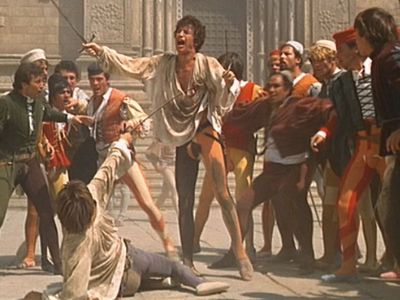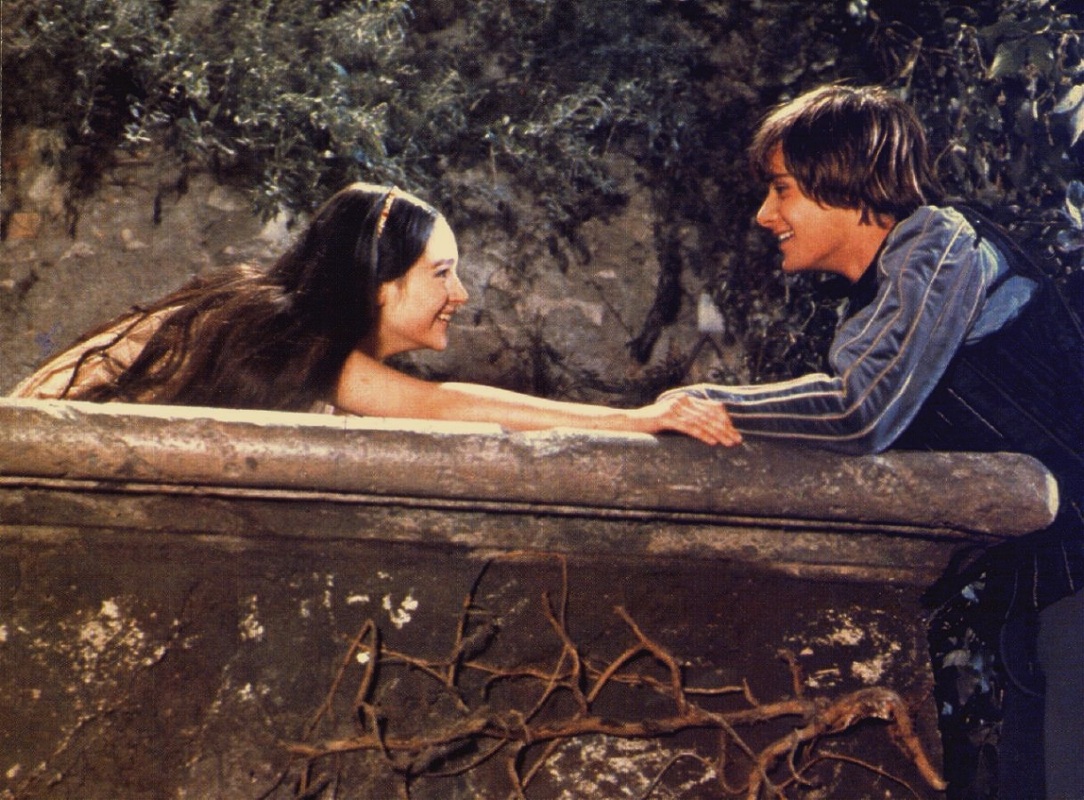| R and J Take Home Exam - Mac Users |
0 Comments
Apparently, there are two "Number 4"s on the test... My error, my apologies. The question regarding the servants has been eliminated. To reduce confusion, I have uploaded the edited version of the test.
Here it is.
Here it is, folks. Remember, this is a temp file, so go ahead and download it for your use. You can type or write answers - your choice.
Good luck. :-) Everything you need to be successful Paris: 'I were if Thursday were tomorrow!' The caption above pretty much sums up what you need to know about 3.4, save why Capulet did it. Why would he force his daughter into a marriage that didn't seem like a great idea at the beginning of the play? To cheer her up.
Because everyone enjoys forced marriages... (sic) Clearly Juliet doesn't, but she also doesn't enjoy having to watch her marriage fade into the sunlight. The light/dark dichotomy seems to come back in 3.5, when Juliet declares, "Let day in, and let life out", as Romeo shimmies down the ladder one final time before heading to his exile in Mantua. Light seems to bring forth death, as daylight and heat seem to bring forth both major fights that have occurred in the play so far. Mercutio and Tybalt die in broad daylight, in Verona's town square. Light would expose Romeo's relationship to Juliet, as it exposed his tortured self when Rosaline turned him away for a life of celibacy. Darkness, however, is able to shield Romeo and Juliet from having their forbidden love broadcast all over Verona. Darkness gives Romeo possibilities for love, and allows Juliet to tell her truths, exposing her desire for her husband. Well, since the audience knows how this play is going to end, let's talk about the concept of dramatic irony. We know that dramatic irony exists when the audience understands/knows more about the plot than the characters on stage. Well, Juliet is torn in her emotions surrounding the death of Tybalt, as well as Romeo's fresh exile. When she cries, the audience knows her allegiance is with Romeo, because he is her husband (remember...this is over 400 years ago; a wife's allegiance is to her husband, not to her father). However, Juliet doesn't exactly want to say farewell to the relationship with her parents, either. She tries to buy time, explaining to her mother why she is so sad, and why she won't marry Romeo. There are a couple of lines that actually beg the question, "How could her parents not get it?" First, when Lady Capulet asks Juliet why she is still crying, Juliet eventually replies, "Feeling so the loss, I cannot choose but ever weep for the friend" (III.v.77-78). She feels the loss of Tybalt, but she forever weeps for Romeo until his return. Lady Capulet believes, however, that she weeps for the loss of Tybalt the man, and Tybalt the family member. No wonder Lady Capulet thinks she's silly; her mourning has no control - but remember, Juliet is feeling the most loss out of anyone in the play at this point. She has the right to mourn...but she can't tell anyone why she would be sad over the exile of a Montague. Lady Capulet just assumes she wants Romeo dead, as everyone else the Capulet house does. Second, when Juliet finds out about her impending marriage to Count Paris, she replies in shock, "I pray you tell my lord and father, madam, I will not marry yet; and when I do, I swear it shall be Romeo, whom you know I hate, rather than Paris" (III.v.121-124). When Juliet says, 'whom you know I hate', Juliet is responding in kind to Lady Capulet's pointed remarks regarding Romeo. Lady Capulet is beside herself. If any of us were Lady Capulet, the reaction would be, "Why in the hell would she say that? Why would she dishonor her family in this way?" So, she washes her hands of her and hands her over to Lord Capulet, who, shaking with rage, threatens to disown her if she doesn't show up at St. Peter's on Thursday. At the end of the scene, Juliet asks the Nurse for some advice...what should she d0? The Nurse doesn't give her much comfort (yeah, she says she does...but we learn that in Act 4 that she no longer can trust the Nurse) - the Nurse simply replies that she should marry Paris and forget Romeo. Juliet asks to go to confession to absolve the sin of dishonoring her parents...that puts her in Friar Laurence's cell in 4.1, ready to commit suicide if he doesn't come up with a solution that works...reasonable or not. Now, for the part of the blog post you were searching for... HERE is what you need to know/understand/review/pray about regarding the quiz... Act II:
Act III:
Short answer questions: What is significant about the Nurse's constant interruptions in Act 2? What is different about the light/dark symbolism in Act 2, Scene 2 versus the light/dark symbolism in Act 3, Scene 5? Act 3, Scene 1: What Many Of You Missed.
After reading your Twitter scenes (which I enjoyed thoroughly, by the way), I noticed that you gathered many of the important points necessary to understand why the play progresses forward. Here's what you caught: 1. Mercutio knows Romeo won't fight...at least willingly. Romeo is a lover, but Mercutio wishes for Romeo to answer the challenge that has been put before him by Tybalt. Mercutio knows that Tybalt is a good fighter, but he is beginning to question Romeo's loyalty to family and friends, especially after he ditches them to go shimmy up the Capulets' castle wall. 2. Benvolio...poor guy, he tried so hard to convince everyone to NOT fight. Benvolio knows that the conditions are ripe for the Capulets and Montagues to fight. He even recognizes within himself that he would fight if his family required it. When questioned by the Prince, Benvolio gives a faithful account of events, but does not consider that the Capulets would accuse him of having false loyalties to the Montagues. Benvolio might be the only reason why Romeo is exiled, and not sentenced to death, because of his account of the last brawl. 3. Tybalt didn't get the blood he wanted. Instead, his own blood was spilled. As Friar Laurence said, "Violent delights have violent ends." This doesn't just happen with love. Often, when we see a character in a literary work with a temper such as Tybalt's, he will self-destruct. His anger blinds him from his objective - to recover his honor by killing Romeo - and goes to focus on Mercutio. Did he not consider that Romeo would then be blinded by anger himself? Did he not consider that this would drive Romeo to commit his fatal act? Perhaps he didn't care. Perhaps. 4. Pay attention to this, because this is something you missed: When Romeo kills Tybalt, he immediately regrets killing him. According to your Twitter feeds, this is something you did not catch. Romeo stabs him, realizes what he has done, and screams into the sky, "O, I am fortune's fool!" He thought he was invincible for a hot second, because of his marriage to Juliet combined with his blind anger for Tybalt's murder of Mercutio. But when he realizes how badly he has jeopardized his marriage in that split second, he regrets having killed his newly found kinsman. He has committed the ultimate sin against a family member. Which brings us to Scenes ii and iii, where he sulks about it and his tears are "womanish." Awesome. III.ii focuses on Juliet's emotional reaction to Romeo's killing her kinsman. The Nurse doesn't help much, as she further confuses Juliet with her back and forth vague commentary. The only solace that Juliet gains is that Romeo is still alive, but NOT BEFORE Juliet spews a line of paradoxes explaining her divisive emotions regarding her recently wedded groom. It is clear that Juliet loves Romeo by the end of the scene, but Juliet still needs to show devotion to her kinsman. In the end, she gives the Nurse her wedding band to give to Romeo, as a sign of devotion and loyalty to her marriage. III.iii focuses on Romeo's irrational and impulsive behavior after being exiled from Verona. Romeo probably knows that death is more extreme and permanent than the banishment decree, but Romeo doesn't have any control over his emotions right now. Friar Laurence exposes Romeo's personality (as his foil!) through his exasperation over Romeo's behavior, by calling him "womanish" and declaring that he has "a pack of blessings, light upon thy back". Romeo just wants his wife, plain and simple. Romeo has a lot of farewells to make at the end of this scene. He still has to go to Juliet, and he will never see Verona in the daylight again. Let me know if you guys have any que Ah, it has finally happened...and it only took a day: Romeo has dumped Rosaline's memory and gone forward to pursue Juliet for marriage...only hours after meeting her?
What the what? A few hours? Shakespeare was not the master of plot, but he did know how to set up a good love story. We can pretend that this conversation happened after a couple of very intense dates, a few good snogging sessions, and then! the passionate proposal...all the while Juliet is playing hard to get. But no...no...just a few hours. Let's break this up into chunks. First: Romeo's monologue - FULL of metaphors that compare Juliet to an astronomical phenomenon, namely the sun and the stars. Romeo is using the dichotomy of light and dark to show Juliet as the 'light' in Romeo's world, as opposed to what his love life was prior to the party (cough, cough, Rosaline...). The metaphors highlight Romeo's idea of perfection; it is fairly clear that Romeo views Juliet as the idea of female perfection. Second: Romeo goes into creeper mode, and then listens to Juliet deliver her "soliloquy", though dramatic irony provides tension for the audience while Romeo intently listens. Whilst speaking, Juliet provides reflections on the duality of a name, asking outright, "What is a name?" It may not be any part belonging to a man, but it is definitely a part of her enemy. This section has Juliet seriously conflicted about how to pursue Romeo, if she pursues Romeo at all (even though, to the audience, she has already declared that she met Romeo "too late", indicating she is, indeed, in love). Romeo then volunteers to discard his name if that is something she requests. Third: Romeo goes in for the kill. Since Romeo has declared that he would give his world up for Juliet, he lays on the flattery in very thick layers. Juliet, at this point, is clearly worried for Romeo's life, indicating that if he was seen, that he would be killed. Juliet is backing off because she's not quite sure what Romeo wants...does he want to sleep with her? Does he want to kiss her? Are his intentions honorable or does he want a one night stand? Fourth: Juliet catches Romeo in a pickle - he tries to swear his love, but she tells him, "Do not swear at all", but especially by the inconstant moon, a symbol for change. Romeo declares his lack of satisfaction, then says what he wants: "the exchange of thy love's faithful vow for mine." Romeo gets what he wants - he just wants Juliet to promise that she is Romeo's Fifth: THE DARNED NURSE! She is interrupting another intimate moment! Romeo and Juliet are discussing the intent to marry, and the nurse will not quit calling Juliet inside! Romeo keeps looking at the empty window...perhaps some foreshadowing to come. After all, the time that Romeo and Juliet have in this play, together, is actually rather limited. Lastly, the figurative language at the end of the scene is sickly sweet; the exchange of metaphors and similes indicate how they have both been properly wooed. Now, it's time for the wedding. In II.iii and II.iv, Romeo sets his plans forth to make good on Juliet's promise. Here's my question of the day: Does II.ii expose Romeo's tragic flaw?? Let's see if Friar Laurence can't tease it out for us. Until, Ms. B | |||||



 RSS Feed
RSS Feed